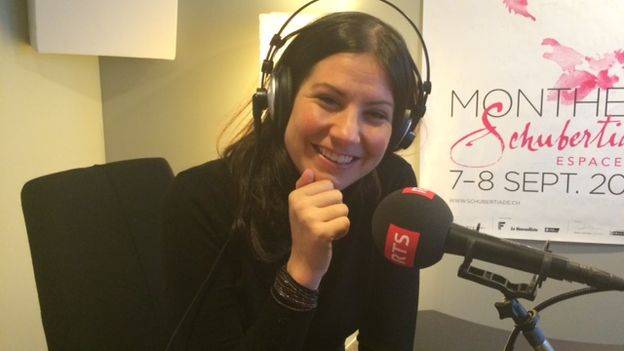Ariane Hasler, a Swiss journalist, correspondent in Paris for RTS (Radio Télévision Suisse), recently hosted distance learning courses for journalists from Radio Ndeke Luka in Bangui and Studio Hirondelle RDC in Kinshasa for Fondation Hirondelle. She draws lessons from these "tele-training" imposed by the Covid pandemic.
What was the profile of the participants in these trainings, and how many people attended these sessions?
Ariane Hasler: In the Central African Republic, more than fifteen people, talk-show hosts and journalists combined. In Kinshasa, in the Democratic Republic of Congo, there were three journalists who make up the "core" editorial staff and who work with correspondents throughout the country. In both trainings the profiles were diverse, a mix of young journalists who are new to the profession and older journalists with more experience, in both cases a majority of men but also women. A common point among all the participants: a real desire to learn and talk about their profession. In the end, the exchanges were very rich and the speed of absorption really "bluffing" in some cases.
How did you organize the distance learning program?
For Fondation Hirondelle and for me, distance learning was a first when it was set up in the Central African Republic. We worked in small groups (maximum 4 people) in two groups of two hours per day, 4 hours in all, with practical exercises to be completed the next day, all over 15 days. It was an intense rhythm, especially when the connection cuts off at every turn and in Bangui, the generator sometimes let us down, cutting off the session altogether!
What subjects and exercises were you able to cover?
My part of the training consisted in going back over the basic techniques of talk-show hosting and journalism. The first question was the same for all the groups: what are your daily difficulties? with a first session devoted to listening collectively to some of their subjects. I believe very much in the virtues of listening and collective debriefing. The participants learn to listen to each other and to give each other advice. Besides, there is nothing like having someone else listen to one of your subjects to identify some of its flaws yourself! We talked about the interview, the report, the portrait, the construction of a program. We also looked at examples of interviews or reports from other radio stations.
This first experience allowed us to observe with Fondation Hirondelle that the remote exercise requires a great deal of concentration on the part of the trainer and the participants, knowing that their daily work does not stop during the training and that the days are very busy for them. For the Congo, we therefore moved to a more "manageable" rhythm in terms of energy and concentration: two hours in the morning with practical exercises in the afternoon. The Central African experience has undeniably allowed me to be more efficient for this second round, especially on logistical issues. During 6 days, we tackled the construction of a three-minute news bulletin, writing questions and reporting. With a real progression, audible on air!
Training journalists at a distance, in countries where connections are often difficult and with daily logistical problems, is a real challenge. How did you manage to overcome the distance and the difficulties?
Through laughter! When you ask yourself 25 times among "can you hear me? can you repeat? can you repeat? did I not understand? "at some point you have to laugh if you don't want to tear your hair out!
I'm kidding, but obviously the Foundation anticipated these problems as much as possible: on the spot, in Bangui as in Kinshasa, a technician attended the training sessions and took care of all the technical logistics. He centralized via Whatsapp all the shared audio fiels in one direction or the other. A presence and support that is indispensable for a training like this one.
What feedback have you received from participants on these trainings?
I have the impression that for them, even beyond the content of the trainings, the fact that Fondation Hirondelle did not "let go" of them and found a way to continue training them, despite the context of the Coronavirus, was in itself very important. Symbolically and concretely, the message is very strong: this virus and its consequences, particularly in terms of travel, will not prevent Fondation Hirondelle from continuing to work with its editorial staff, to continue to train them and to help them progress. It's also funny because on the other side of the computer, several participants admitted to being more concentrated than in "face-to-face" sessions, as they say. Maybe precisely because it was more chaotic and full of improbabilities!
What lessons do you draw from this personally and for future training courses?
For my part, I think it's fantastic that these distance learning courses were able to be set up and that the Foundation's training work doesn't stop because of a virus. When things return to normal, this experience may allow Fondation Hirondelle to set up follow-up training sessions, for example, where over 4-5 days a trainer intervenes remotely to reinforce a production or coach a person or a team. This makes it possible to act quickly and efficiently, on time. On the other hand, it is obvious that by not being on site, by not "meeting" the contexts in which these editorial teams live, the conditions in which they work, by not observing the interactions and functioning within the editorial team, we miss out on a whole dimension and valuable information to help them progress and work. Distance learning, in this context, is an excellent support but cannot be the only vector of learning. Conclusion: we look forward to a return to normal!
